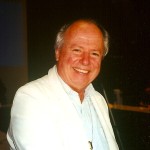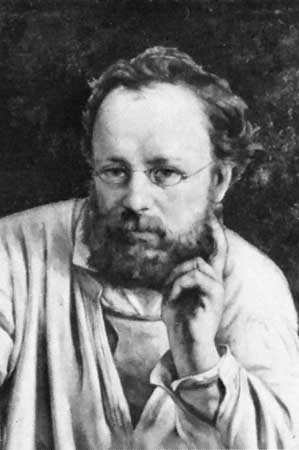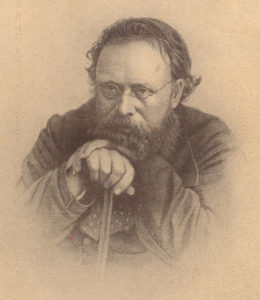Pierre Joseph Proudhon (15 Jan 1809 – 16 Jan 1865): Pioneer of the Civil Society
BIOGRAPHIES, 16 Jan 2017
Rene Wadlow – TRANSCEND Media Service
Pierre Joseph Proudhon (1809-1865) was born on a 15th January and died on a 16th January so that these days we can mark either the anniversary of his birth or his death. Proudhon along with Karl Marx (1818-1883) are the two great writers of social progress in the 19th century. While Marx wrote a good deal of heavy Germanic prose which is difficult to wade through, he penned one great text with Friedrich Engels (1820-1895) The Communist Manifesto “ A spectre is haunting Europe – the spectre of Communism. All the powers of old Europe have entered into a holy alliance to exorcise this spectre: Pope and Czar, Metternich and Guizot, French Radicals and German police-spies.” And ending with the oft-repeated battle cry “The proletarians have nothing to lose but their chains. They have a world to win. Workers of all countries, unite!”
Proudhon was also a prolific writer and his writings are not much easier to wade through. He was self-taught. Coming from a poor family, he did not go beyond grade school before he became an apprentice to a printer. There, he taught himself but always kept a rough if popular style in contrast to Marx who was university-educated and who from a young age participated in Berlin intellectual circles. There is no single text of Proudhon to compare with
The Communist Manifesto, though two men influenced by Proudhon, Michel Bakounine (1814-1876) and Peter Kropotkine (1842-1921) were fine writers. Kropotkin’s Mutual Aid (1902) is well worth reading today.
Proudhon’s late work Du Principe Fédéralif (On Federalism) (1860) is his most lasting and most important work. In it he develops his major themes: justice, liberty, equality, and the need to develop autonomous communities tied to each other by contracts, thus forming a federation. However, unlike other forms of federalist thinking which sees a link between organized territorial units (states), Proudhon saw the need for links between many different types of units: towns, factories, workshops, cooperatives. With such links among productive units, there would be less need for political governments, especially not centralized governments.
It is this fear of centralized government and centralizing institutions such as the Catholic Church, which has led some to claim Proudhon as an ‘anarchist’. Anarchist in the sense of ‘no government’ would be an incorrect reading of Proudhon. Rather Proudhon can be best described as a ‘pluralist’ holding that freedom of thought and expression, freedom of communication and movement will usually be better served in small, decentralized and voluntarily-federated communities rather than in the system of state nationalism growing in his day. Thus, Proudhon was opposed to the process of the unification of Italy. See his La guerre et la paix (War and Peace) of 1859. Most European liberals supported the unification of Italy as a sign of progress replacing the despotic city-states, the large Papal holdings and the Austro-Hungarian Empire. But Proudhon was anti-centralization, opposing French Jacobin thought, which had been the centralizing party during the French Revolutionary period. Proudhon admired the defeated Girondin who held to decentralization and local liberties.
Proudhon’s emphasis on federalism among economic units and not only political units had an influence on what in French thought is called the ‘integral federalism’ of such men as Robert Aron (no relation to the better known political sociologist Raymond Aron), Alexandre Marc, and Denis de Rougemont. See the useful overview by Jean-Louis Loubet del Bayle Les Non-Conformistes des années 30. (Paris: Le Seuil, 1969).
It is, however, Proudhon as the pioneer of the concept of ‘civil society’ and the efforts of linking ‘Europe from Below’ that I would like to stress for the contemporary importance of Proudhon. Much of the thinking of ‘Europe from Below’ grew from efforts to bridge the East-West divide of Europe and to limit the dangers of war from the mid-1970s to the end of the 1980s. As Mary Kalder writes in Mary Kaldor (ed.) Europe from Below (London: Verso; 1991) “Ten years ago, a group of us launched the European Nuclear Disarmament (END) Appeal for a nuclear-free Europe. The Appeal attracted thousands of signatures from all over Europe and beyond, and was one of the mobilizing documents of the new peace movement which sprang up in Western Europe in the early 1980s. The Appeal called for nuclear disarmament through unilateral, bilateral and multilateral means, but it was also an appeal to end the Cold War. It accorded responsibility for the Cold War to both the United States and the Soviet Union, and insisted on the link between disarmament and democracy.”
As Vaclav Havel writes in the same collection of essays “We emphasized many times that the struggle we had taken on had little in common with what is traditionally understood by the expression ‘politics’. We discussed such concepts as non-political politics, and stressed that we were interested in certain values and principles and not in power and position. We emphasized the importance of the spirit, the importance of truth, and said that even spirit and truth embody a certain kind of power.”
‘Non-political politics’ would be a useful term to describe Proudhon’s ideas, as would be ‘civil society’ as set out by Ernest Gallner in his Conditions of Liberty: Civil Society and its Rivals (London: Penguin Books, 1996) “Civil Society is the idea of institutional and ideological pluralism, which prevents the establishment of monopoly of power and truth, and counterbalances those central institutions which, though necessary, might otherwise acquire such monopoly. The actual practice of Marxism had led, wherever it came to be implemented, to what might be called Caesaro-Papism-Mammonism, to the near-total fusion of the political, ideological and economic hierarchies. The state, the church-party and the economic managers were all parts of one single nomenklatura…Civil Society is that set of diverse non-governmental institutions which is strong enough to counterbalance the state and, while not preventing the state from fulfilling its role of keeper of the peace and arbitrator between major interests, can nevertheless prevent it from dominating and atomizing the rest of society.”
The concept of civil society comes directly from Proudhon even if he is not always quoted. The concept of ‘civil society’ is probably the platform for future progressive action. What makes Proudhon still a pioneer is that he saw that his concepts of federalism-‘civil society’ networks could not exist only within the territorial limits of an existing state but had to be trans-national, thus creating the base for a decentralized European society.
_____________________________________________
 René Wadlow, a member of the Fellowship of Reconciliation and of its Task Force on the Middle East, is president and U.N. representative (Geneva) of the Association of World Citizens and editor of Transnational Perspectives. He is a member of the TRANSCEND Network for Peace, Development and Environment.
René Wadlow, a member of the Fellowship of Reconciliation and of its Task Force on the Middle East, is president and U.N. representative (Geneva) of the Association of World Citizens and editor of Transnational Perspectives. He is a member of the TRANSCEND Network for Peace, Development and Environment.
This article originally appeared on Transcend Media Service (TMS) on 16 Jan 2017.
Anticopyright: Editorials and articles originated on TMS may be freely reprinted, disseminated, translated and used as background material, provided an acknowledgement and link to the source, TMS: Pierre Joseph Proudhon (15 Jan 1809 – 16 Jan 1865): Pioneer of the Civil Society, is included. Thank you.
If you enjoyed this article, please donate to TMS to join the growing list of TMS Supporters.

This work is licensed under a CC BY-NC 4.0 License.


Thank you for an insightful article on Proudhon. His ‘bottom’s up’ decentralized approach reminds me too of Father Edwin John of Nagercoil, TN, INDIA.
good food for thought as we all go forward!